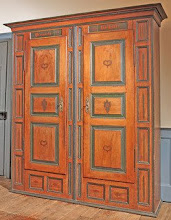I (Andrew) hear this a lot. Too much, in fact. When talking with a potential consignor, I often give them my thoughts on what a given object might bring at auction (always subject to further examination and further research, of course). So often, when I say that Joe Consignor's refinished cherry 4-drawer Sheraton chest will probably bring 500-800 at auction, I get, "But I paid more than that twenty years ago." I then, of course, begin lecture number 313, which is on the economics of the ever-changing marketplace and that trends come and go, and that today's marketplace emphasizes different things than the marketplace of the 1980s.
It seems to me that a large number of collectors, when they were building their collections, either assumed, or were told by dealers/auctioneers, that antiques appreciate in value. These collectors are then disappointed by my estimate, and then often again when their things sell.
It can be true that antiques appreciate in value. It can also be true that antiques can depreciate in value. Frankly, I don't believe that anyone can reliably predict what will and will not appreciate. Sure, if you are fortunate enough to be able to buy the very best (best forms, best decoration, best condition, etc. etc. etc.), AND you don't have to pay top retail (say, at the Winter Show in NY), then your collection might have a better-than-average chance of selling for more than you paid. Maybe. Let's not forget about trends. Victorian was all the rage a generation ago. Today...not so much. In the early 2000s, weathervanes were breaking records, but that market has already cooled, and I really don't believe the $6 million Indian weathervane purchased in NY a few years ago will ever achieve that price again.
On one level, this trend frustrates me. As an auctioneer, I feel like I'm getting blamed because the market has changed and someone's stuff isn't worth as much as it once was. But on a more important level, this trends saddens me. These life-long collectors have poured their hearts and souls into their collections, have felt a quickened pulse when "on the hunt" for their next purchase, and smiled every time they looked around their home and the objects that filled it. These folks' last emotion related to their collection is that of disappointment. Folks, that's truly unfortunate. It's hard enough to let go of your lifetime collection. I have had collectors cry when I emptied their house because they know that they will miss the stuff I'm taking to auction. I can appreciate that. I'm going to be like that. But then, for some reason, some of these same collectors seem to forget all the good memories, all the joy, all the passion, and focus only on the dollars and cents, thus the disappointment. Yes, I'm sure it might be a bit of a blow to the ego that the market doesn't "appreciate" your collection like you do. But you know what? No one will appreciate YOUR collection like YOU do. So why worry about it?
I do realize that for some, the financial hit might be troubling. I'm truly sorry for that. And that is why we NEVER encourage anyone to think of their antiques as investments. We want folks to collect because they love the stuff. When we talk to our friends about antiques, we talk about history and art and usefulness and green. Yes, we also talk dollars and cents, but we talk about "retained value," not appreciation or investment.
Living surrounded by history and art...that's why we buy this stuff. And when it's time to sell, we're going to be thankful that we were able to act as stewards for a collection of history and art. If we make money, great; if we don't, we'll consider the loss a small price to pay for the memories. Isn't that why you started collecting in the first place?
Wednesday, July 8, 2009
Subscribe to:
Post Comments (Atom)


No comments:
Post a Comment